Book contents
1 - Explaining Islamist Dominion
Published online by Cambridge University Press: 05 July 2014
Summary
Much of the current state of theorizing on the electoral successes of Islamist parties can be captured in two Egyptian newspaper items, written more than 55 years apart. The first is a cartoon that appeared in the Muslim Brotherhood's newspaper in 1945 (Figure 1.1). In it, we see two candidates addressing the same constituency. In the first panel, the (presumably secular) candidate proclaims, “I'll dig irrigation canals and drainage ditches for you. I'll get you more rations. I'll get your sons government jobs. Etc. Etc.” The voters, however, appear unmoved. Turning their backs on the candidate, they grumble, “We have had our fill of such promises.” In the second panel, we see the Muslim Brotherhood candidate. “God is our destiny!” he declares, reciting the first item from the Muslim Brotherhood catechism. “The Prophet is our leader! The Qur'an is our constitution! And death in the path of God is our fondest wish!” The voters lean toward him intently, smiling in approval, exclaiming, “What is more beautiful than such talk?” Presumably the next panel, if there were one, would show the Brother contentedly counting votes.
The second item is a December 22, 2012 story that appeared in the Cairo-based opposition newspaper al-Dustūr during the referendum on the 2012 Egyptian constitution. That constitution, now suspended, had been written by an Islamist-dominated constituent assembly, and was opposed by practically every non-Islamist political party in Egypt for, among other things, its insufficient attention to the rights of women and non-Muslims.
Information
- Type
- Chapter
- Information
- Counting IslamReligion, Class, and Elections in Egypt, pp. 14 - 42Publisher: Cambridge University PressPrint publication year: 2014
Accessibility standard: Unknown
Why this information is here
This section outlines the accessibility features of this content - including support for screen readers, full keyboard navigation and high-contrast display options. This may not be relevant for you.Accessibility Information
- 1
- Cited by
